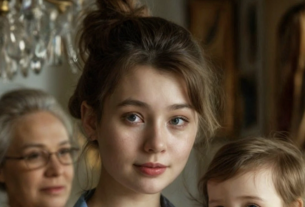Everyone in the room was laughing—except her. Laughter echoed off the walls of the dojo, sharp and mocking. A man in a white kimono leaned forward laughing and, without hiding his contempt, pointed a finger at her:
“Come on, try it! Show us what you’re made of!”
She stood still, as if rooted to the floor. In her hand was a wet mop, water dripping onto the blue mats. Her gray pants were stained with bleach, her hands trembled slightly. But it was not a tremble of fear—it was a response to something deep, old, long buried inside.
As the laughter gradually died down, an oppressive silence hung over the hall. Everyone watched, expecting a humiliating farce, a quick and pitiful defeat. No one could have guessed that something else was about to happen. No one knew that inside this woman—whom everyone thought was just a janitor, whose name most had forgotten—there lived a strength that could not be measured by belts or bought with applause. It was a strength forged in silence, in suffering, in long years of solitary struggle just to survive.
Her name was Svetlana Martynova. She was forty-three years old. A single mother. For five years she worked as a janitor at the West Valley Martial Arts Academy. The domestic violence she had fled left scars on her soul no less deep than those hidden beneath her sleeves. She came before sunrise and left when the city was already plunged into night. Her world was filled with the smell of bleach, the creak of a bucket, and the weight of a mop. She moved silently, wiping sweat, dirt, and other people’s arrogance from the floors. No one noticed her. No one wondered why her left hand seemed bound, why she always wore long sleeves even in the heat, why she so often froze at the doors, watching the training sessions.
Twenty years ago, Svetlana had been a high-class taekwondo fighter in the city. She was being prepared for the Olympics. But her dream was destroyed by her husband—the coach who first charmed her, then broke her. He destroyed her confidence and turned her into a shadow of herself. After years of humiliation, she fled, taking with her her little son Danila. They had only two backpacks and memories of the Svetlana who once flew across the tatami.
America did not become salvation. Getting legal papers was almost impossible, finding work even harder. She worked wherever she could: cleaning apartments, washing dishes, mopping floors in restaurants. Until one day she ended up at West Valley. The pay was meager, but the chance to be near martial arts gave her a sense of connection to the past—to the life she had lost. She kept silent about her past. Not out of pride, but because she didn’t want pity and had no strength to relive everything again. She simply worked, eyes down, silently repeating the movements her body remembered when she thought no one was watching.
Her son, now almost grown, asked her to enroll him in training. Svetlana saved every coin, every tip to pay for his lessons. She never asked for discounts. Danila turned out to be talented—strong, focused, kind. He resembled her—the her she had been before life stopped being fair.
That day, the academy was holding a demonstration. Parents, instructors, and the best students were present. Svetlana, as usual, was on the sidelines—wiping windows, collecting bottles, trying to stay unnoticed. The star of the show was Jake—a former state champion, confident, charismatic, overly sure of his importance. He joked, teased students, basked in the attention. Then, wanting to add a final touch, he noticed Svetlana in the corner with her mop. He smirked:
“Hey, don’t you want to try?”
The hall exploded with laughter. Someone giggled nervously, someone else looked down. Svetlana froze. Should she smile? Pretend it was a joke? Jake, pleased with the reaction, continued:
“Let’s see what the janitor can do!”
Something inside her broke—or, on the contrary, was restored. She looked at him not with rage, but with icy, silent calm. She carefully leaned the mop against the wall. The sleeves of her clothes slid down, revealing old scars on her wrists. She stepped into the center of the hall. Among the crowd—whispers, laughter, confusion. Jake smirked, not realizing he had just awakened not just a reaction, but a storm.
“Alright, don’t be scared,” he said, raising his hands in a mock defensive gesture.
Svetlana bowed:
“Perfect.”
“Exactly.”
She took a fighting stance—and two senior coaches instantly tensed as if recognizing something important. Jake threw a light punch—clearly expecting her to flinch or fall. But she easily blocked it; her movements were smooth like flowing water, precise, calculated, dangerous. The second strike came faster, harder. She dodged, spun, and with one sharp motion knocked the support out from under Jake’s feet, sending him crashing onto the mat. His kimono crumpled, and his confidence shattered to dust.
Silence. Thick, deafening. Jake lay on his back, looking up at her—confused, stunned. Svetlana held out her hand. He slowly accepted it and stood up. And bowed—not out of politeness, but sincerely, with respect, with acknowledgment.
Someone whispered:
“Who is she?”
And another voice, quieter:
“That’s Danila’s mother.”
Applause rolled through the hall—not for a trick, not for a spectacle, but because people saw something genuine. Something that made them fall silent, think, and feel.
That night Danila hugged her tighter than ever:
“Why did you never tell me?”
She kissed his forehead and quietly said:
“You don’t need to know who I was to become who you are.”
A week later the academy offered them free lessons—not just Danila, but Svetlana too. The head coach—a silent elderly Korean who had been watching everything—approached her and bowed low:
“It would be an honor for us to see you on the tatami, Miss,” he said with sincere respect.
At first, she refused. Said she was too old, too tired, that it wasn’t for her. But Danila looked into her eyes and whispered:
“Please. Just once. For yourself.”
And she agreed. She took out an old, faded belt—the very one that had lain in a secret corner of her memory for twenty years. She stepped onto the mat not as a janitor, but as the woman she once was and had never stopped being. In the evenings, they trained together—mother and son. And now around them stood not just students, but people who looked at her with respect. Gradually, stories began to be told in the hall—about loss, fear, overcoming, about how everyone fought in their own way.
Svetlana gave them not just inspiration. She reminded them that behind outward roles, behind masks, behind silence, whole worlds can hide. Worlds of strength, dignity, and resilience. Worlds worth seeing.



